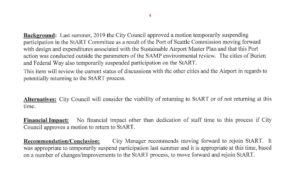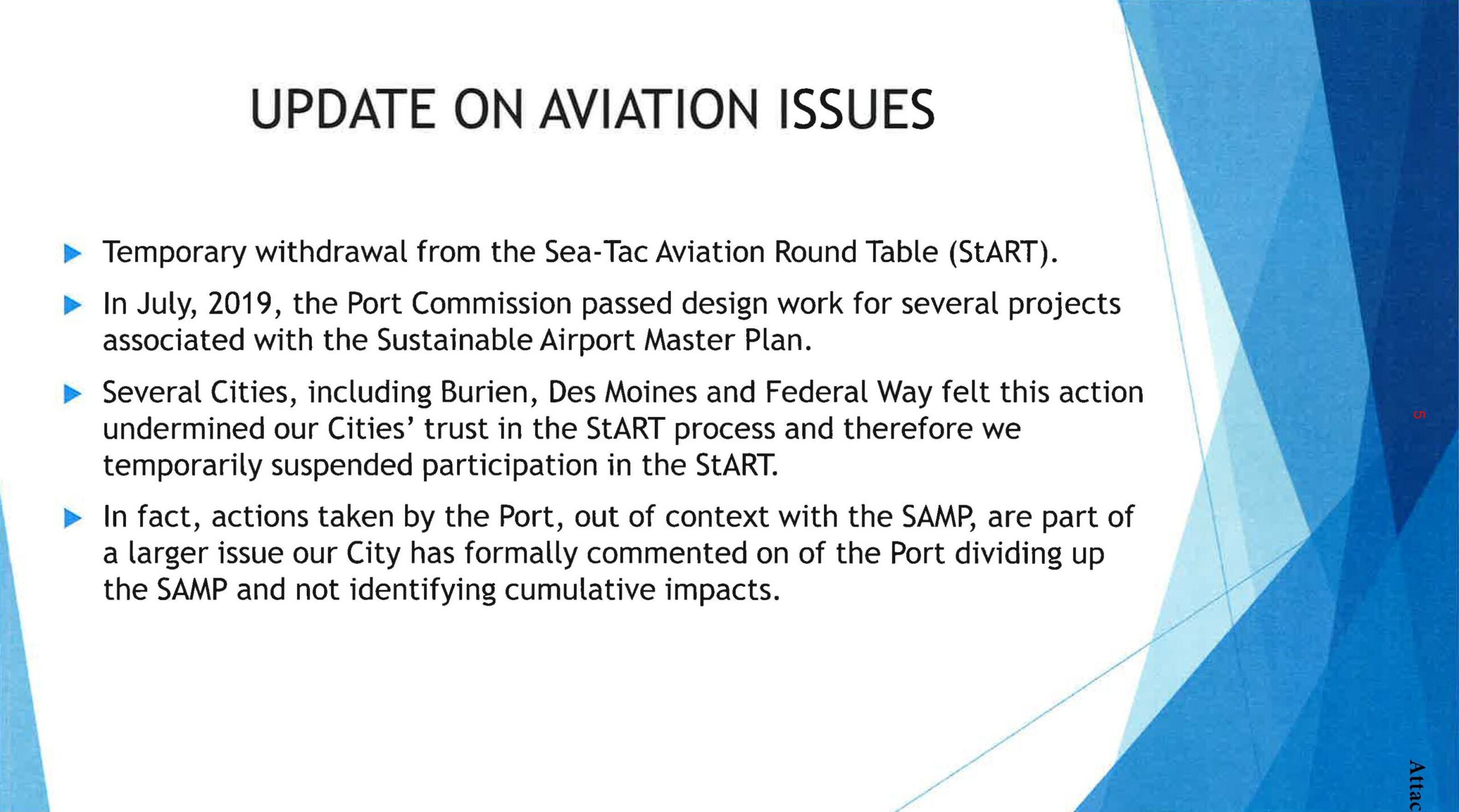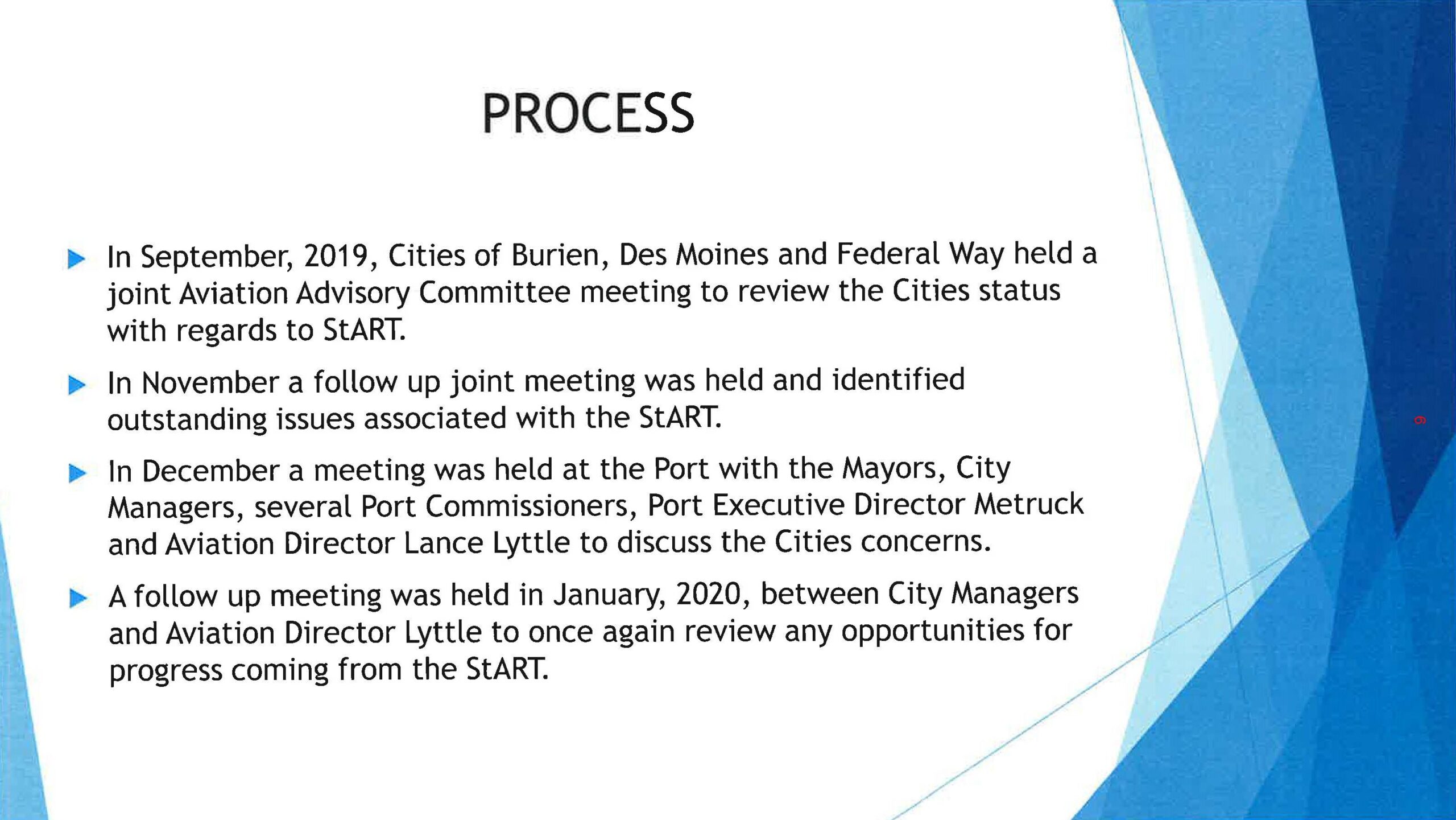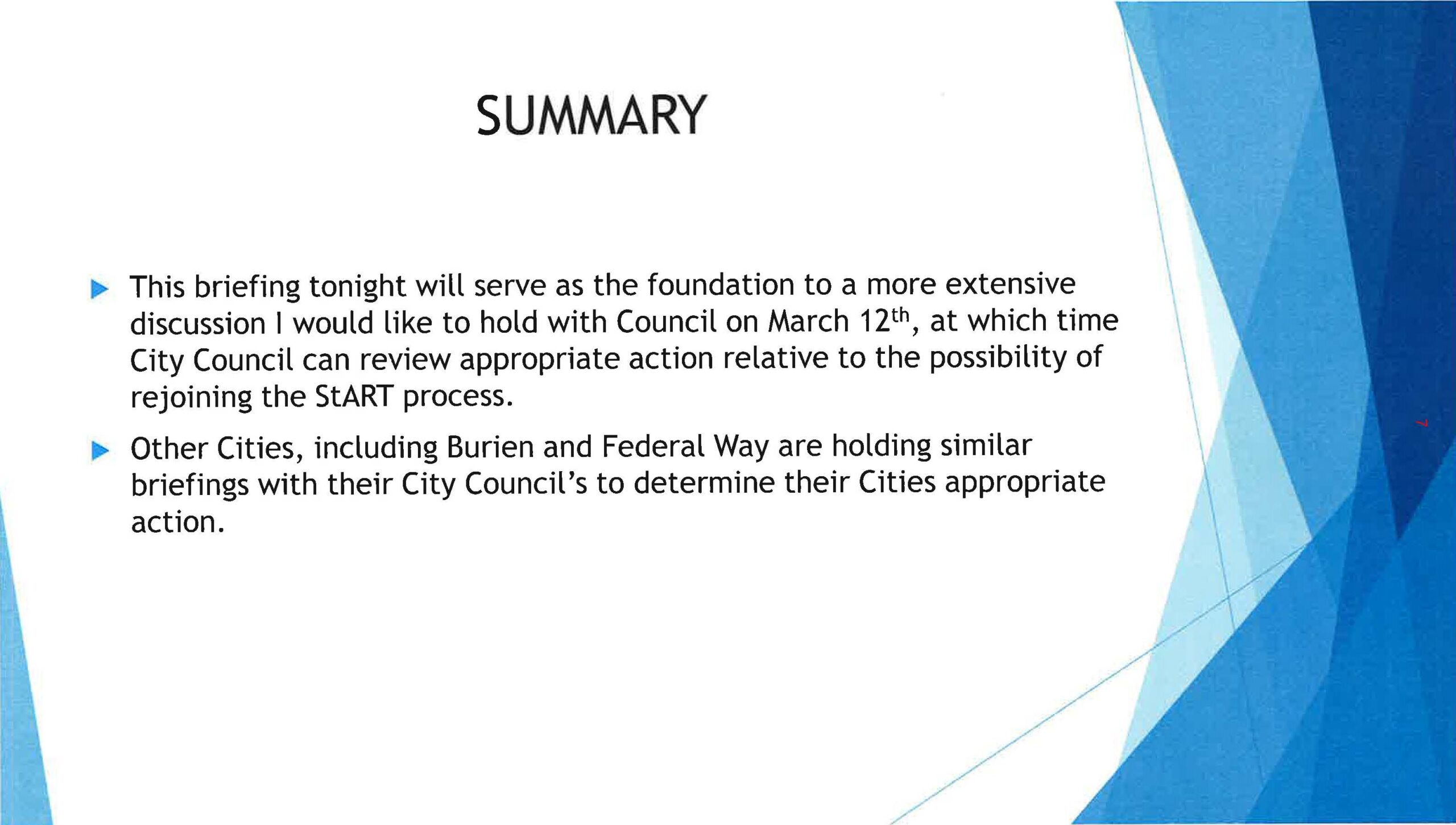Transcript
 City Manager Matthias: “The next item we’re going to discuss is our city’s future participation in StART, which is the Sea-Tac Airport Stakeholder Round Table. I had prepared a PowerPoint presentation, but it seems it didn’t make it into the virtual format, so I’ll refer Council to your packets and walk through this.
City Manager Matthias: “The next item we’re going to discuss is our city’s future participation in StART, which is the Sea-Tac Airport Stakeholder Round Table. I had prepared a PowerPoint presentation, but it seems it didn’t make it into the virtual format, so I’ll refer Council to your packets and walk through this.
Let me go back about a year and talk about StART. We participated in this committee, which was formed by the airport to include the FAA, the airlines, and six cities affected by airport operations. The city managers had met with Lance Lyttle over about six months to establish rules and processes.
As we moved forward with StART, we began to notice some problems with its operation. The airline representatives weren’t high enough in their organizations to make decisions that could affect operations or solve impact problems on the cities. The FAA was reluctant to engage. It became a situation where everyone would say it was someone else’s problem – the FAA would say it’s the airlines, the airlines would say it’s the airport, and the airport would say it’s the airlines. We had hoped StART would help clarify responsibilities and create paths for change.
I want to acknowledge that Airport Director Lance Lyttle had the best intentions, but there were structural problems in how solutions were derived. About a year ago, the Port of Seattle held a remote meeting in Kirkland where they passed legislation and allocated resources for the Sustainable Airport Master Plan (SAMP) to begin some near-term projects.
Our city, along with Burien, SeaTac, Normandy Park, and our national consultants, had concerns that the port was breaking off near-term projects and addressing them separately. We felt this violated SEPA and possibly NEPA – you can’t break a long-term project with cumulative impacts into small pieces and then do environmental assessments of the small pieces while claiming you’ve legitimately fulfilled your requirements.
After this meeting and some mutual discussions, the cities of Federal Way, Burien, and Des Moines temporarily suspended participation in StART to make the point that this wasn’t fair or consistent with the port’s statements about honoring our concerns and allowing input on potential impacts.”
Following this, Federal Way, Burien, and Des Moines held two joint meetings – one in Burien with our Aviation Committee and another in November in Des Moines. We identified issues that needed to be addressed before we could return to StART. In December, we had a significant meeting that included Mayor Pina, Mayor Matta from Burien, Mayor Ferrell from Federal Way, Brian Wilson, City Manager of Burien, myself, and others. We met with Executive Director Metruck, Commissioner Bowman (who was then President of the Port Commission), and Port Commissioner Ryan Calkins.
During this meeting, we had a frank discussion about trust. The port acknowledged our concerns and admitted they hadn’t looked at it from our perspective. They understood why we perceived their actions as less than fair. Following this discussion, the mayors and port commissioners agreed that city managers should resume discussions with Airport Director Lance Lyttle about outstanding issues.
We met with Lance and had about 14 items from our joint committee meetings to discuss. In October, when it became clear we’d be negotiating with the port, the Des Moines City Council set fairly flexible parameters for myself and Mayor Pina. They didn’t specify that certain things had to be achieved before we could return, but rather that we needed to feel returning would be worthwhile.
Burien has taken a more demanding approach, but they have a different relationship with the airport due to their FAA lawsuit and other considerations. Federal Way has fewer concerns, except in Marine Hills where they face noise impacts. Recently, I had a very positive phone call with Lance Lyttle, and it seems like this might be a good time to re-engage, particularly given the current situation with COVID. Airport operations are significantly reduced, which may give us some leverage in how things evolve going forward.
Interestingly, Senator Karen Keiser was recently on TV discussing the process of selecting a second airport in Washington state. She made the comment, which we agree with, that Sea-Tac is at capacity now. We need to address current operational impacts while also considering alternatives and understanding COVID’s long-term impact on airline traffic and goods transport.”
I’ve spoken with Federal Way’s chief of staff (Bill Vadino) about possibly rejoining StART, and they indicated they would be watching our decision and would likely want to join us if we return. Burien has a slightly different situation – their Aviation Advisory Committee structure is more complex, with Council Member Nancy Tosta chairing and the mayor attending meetings. They’re encouraging us to wait until they figure out their position before we all move forward together.
As for our own Aviation Advisory Committee, we had five members, but two have moved out of the city. As of January, I suspended those meetings as chair since we weren’t sure what we’d be working on. The main upcoming issue is the Sustainable Airport Master Plan. I would recommend re-engaging with StART at this point. If I’m wrong, we can revisit and change our approach, but that’s my recommendation.”
Council Member Nutting: “I agree. We’ve been out of StART for about six to nine months now – I’ve lost track with COVID. I think we’ve proven our point. As one of our other council members says, ‘if you’re not at the table, you’re on the table.’ We need to find out what’s going on. Maybe it’s just temporary to see where we’re at, but I believe it’s the right thing to do now – rejoin StART and do a test run.”
Deputy Mayor Mahoney: “Michael, will we have more input on the agenda? Was that part of the agreement?”
City Manager Matthias: “That’s a great question. There were several issues, especially ones Burien was concerned about. The last time we met with Lance Lyttle, we had two meetings with all six cities – including Tukwila, SeaTac, Federal Way, Burien, Normandy Park, and others. When the SAMP issue came up, three cities chose to remain in StART while we three withdrew.
One significant issue was the discussion about merging StART into the Highline Forum, which would involve elected officials. Another concern of mine was dissatisfaction with how the facilitator conducted meetings. We also wanted co-equal agenda setting, where we meet with the airport beforehand to establish the agenda. Previously, the airport would set the agenda, get it to us late along with supporting materials, and expect intelligent discussion. As you know, if you control the agenda, you control the meeting. If we rejoin, I’d want to communicate these concerns to the airport and monitor their resolution over time.”
Deputy Mayor Mahoney: “When we decided to make our statement, did you feel that the absence of SeaTac, Tukwila, and Normandy Park hurt our negotiating power?”
City Manager Matthias: “What was surprising was that the issue centered on their action on SAMP – they’d allocated millions for design aspects of near-term projects. That was unfair, and it was surprising that three cities accepted it. Burien has been very adamant about protecting their interests, spending significant money on legal bills and prevailing in some areas. Federal Way wanted to join us in making a point. There was considerable lobbying by the airport, including possibly involving a former Des Moines mayor, to prevent this split. We were disappointed because it became three cities for, three against, which raised questions about our leverage.”
Deputy Mayor Mahoney: “Why didn’t we consult the Aviation Committee about rejoining StART?”
City Manager Matthias: “We had those two joint Aviation Advisory Committee meetings with Burien and Federal Way in September and November, and our committee members attended as they wished. What evolved was this list of concerns, but then the discussion elevated to the mayor level with the port commissioners. Stephanie Bowman wanted to apologize directly to the mayors. Then we returned to the original model of city managers meeting with the airport director. We’re not meeting as an Aviation Advisory Committee now, partly due to COVID complications, but also because I didn’t want to waste their time. The next significant item will be the SAMP, and we’ll reconvene them then to review consultant recommendations.”
Deputy Mayor Mahoney: “I like the idea of a six-month probationary period, but what benefits do we gain by rejoining StART?”
City Manager Matthias: “That’s the ‘$64,000 question.’ Brian Wilson asked the airport early on if this committee just helps them check a box for Federal Aviation requirements. We’ve always been told no, but the real issue is that if we’re not part of StART, we’re not getting anywhere beyond where we are now. Everything will go into the SAMP, we’ll file appeals, but there’s no room for anything good to potentially happen. We don’t put ourselves at risk by rejoining – we can always take the same action we took before. We’re better off being at the table for future potential rather than doing nothing at all.”
Council Member Martinelli: “I believe the council made a good decision last year in suspending participation. After researching and hearing the presentation, I don’t think enough has been done to justify rejoining. We would have much more weight if we work further with Federal Way and Burien, compromise on agreements we all support, and move forward as three cities together. The three of us represent half of the cities involved in the committee. I think reversing our decision now would be wrong.”
Council Member Harris: “I agree with Mr. Matthias that we should rejoin, but it’s essential we do so as three cities. I move to either postpone the vote until September 10th or make our rejoining effective September 10th, giving our peer cities the opportunity to get on board. We need to make a joint statement if possible.”
Council Member Buxton: “StART is about advocacy for our city and understanding the possibilities when we come to the table. This area’s history is about exploring, settling, and securing this region and its waters for commerce. Even with projects like Puget Sound Gateway, we’re a cog in a historical and global commerce machine. I believe the most effective advocacy for our city is at the regional and national level, and the most effective intervention is mitigation. With the Port being regional and the FAA being national, they’re willing to come to the table. As our mayor says, ‘if you’re not at the table, you’re what’s for lunch.’ We’ve had a year to work on issues of concern, and I don’t think waiting longer will resolve anything further. I support rejoining now, but I feel strongly about setting a specific date for the six-month review.”
Council Member Bangs: “Given what our city manager has shared, and considering Federal Way is waiting to see what we do, while Burien has their own interests but isn’t coming back soon, I support returning to the table. With three cities already there, we’d become the fourth, and if Federal Way joins, that makes five. We don’t know what Burien will do – they may never return, especially with their lawsuits. COVID-19 has significantly impacted transportation – I’m under the third runway right now and have only heard three planes during this meeting. While noise impact is one thing, the total environmental impact is what we’re talking about, and we need to be at the table for our voices to be heard. We need agenda items and documentation well in advance of meetings.”
Deputy Mayor Mahoney: “Michael, is the first meeting in August or September?”
City Manager Matthias: “I don’t know the exact date. They had a meeting at the end of June, and there may be another one in two months. August is always strange for scheduling.”
Deputy Mayor Mahoney: “I agree with Council Member Bangs. It’s time. Whatever negotiating power we had, we may not have now. We have something to gain by talking versus not talking. I agree with Council Member Buxton about re-evaluating in January. One of our conditions should be input on the agenda and materials provided at least 10 days prior to meetings. That shows good faith and gives us some concessions.”
City Manager Matthias added: “The Port has sincerely tried to work with us on some issues. Eric Shenfeld, who does their federal government lobbying, is really good. They’ve worked with Adam Smith’s office and looked at ultra-fine particles at a national level, trying to ensure Sea-Tac is included in the national airports review process. While the Port’s view of what’s good for them and our view of what’s good for us sometimes aren’t remotely similar, there are issues we can work together on.”
Council Member Harris then made a motion to postpone the vote until September 10th, seconded by Council Member Martinelli. After discussion, the motion failed 2-5.
The Mayor then presented a new motion: “to direct the city manager to inform the Port of Seattle that the city will be rejoining StART effective immediately, with a review in February 2021, and with the condition that we have joint input on agenda creation and materials provided 10 days prior to meetings.”
The final vote was:
In favor: Council Member Nutting, Council Member Bangs, Council Member Buxton, Deputy Mayor Mahoney, and Mayor Pina.
Opposed: Council Member Martinelli and Council Member Harris
Motion passed 5-2.


